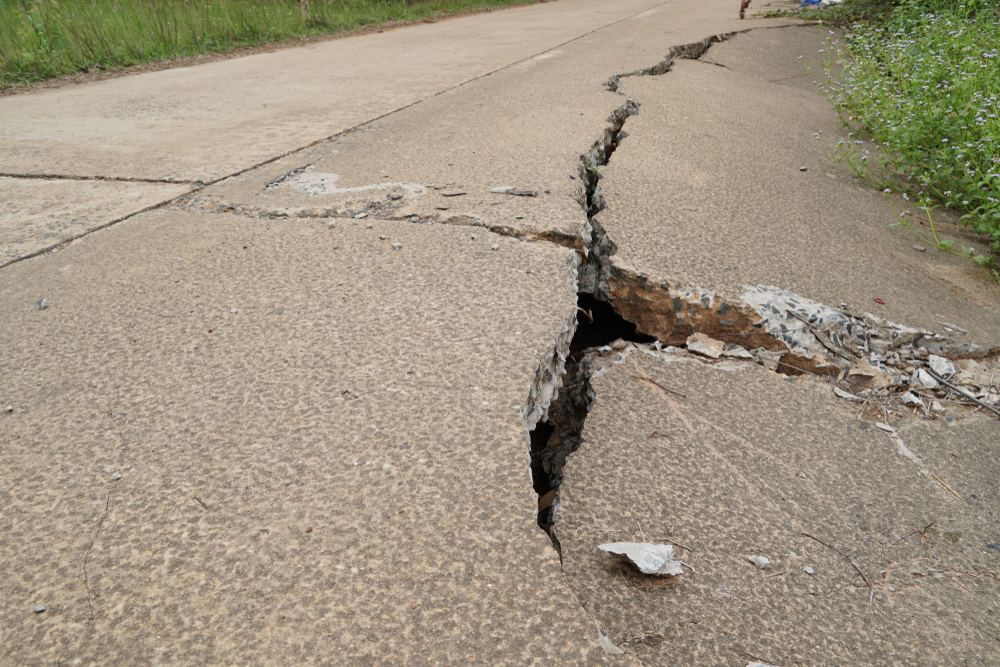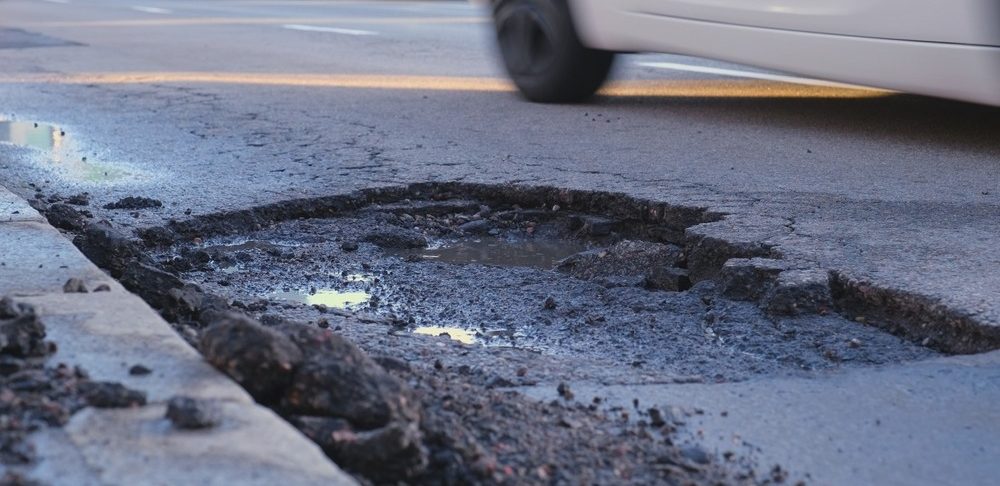Many homeowners choose asphalt driveways because they last a long time and aren’t costly. However, like all materials, asphalt can eventually fail and show signs of wear and tear. It is important to be aware of these signs so that you can take action to repair or replace your driveway before the damage becomes too severe.
Types of Asphalt Failures
Most of the time, you can look at your driveway and tell if it needs to be fixed. If you want to maintain the beauty of your driveway, we’ve listed the most common ways that asphalt fails on driveways.
Cracks or Faults

One common sign of asphalt failure is the appearance of cracks on the surface. Various factors can cause these cracks to appear, such as:
- Fluctuating temperatures
- Heavy vehicles
- Tree roots
- And more
Faults in asphalt pavement can happen in the sub-base gravel and compacted soil layers beneath the surface. When these layers fail, the pavement surface can become unstable and open to more damage. Improper compaction of the subbase layers during construction or settling of the subgrade lead to faults over time.
You can fix most small cracks with an asphalt crack filler, but larger faulting below the surface may indicate that the gravel underneath the asphalt surface needs repairs or a complete replacement.
Cracks in your driveway can be obvious, but faults may be more difficult to see. Determining what causes cracking or faulting can help you decide whether a repair or replacement by an asphalt driveway contractor is necessary. Here are a few common causes of cracks and faults.
Ice Melt and Refreeze
In the Midwest, ice melt and refreeze faults are normal for hard surfaces, and they are usually easy to repair without the help of a specialist. However, if these fractures widen and become big holes, it may be time to seek guidance from a driveway repair professional to extend the lifespan of your asphalt.
Poor Installation
Cracks like spiderwebs or alligator skin commonly appear in driveways because of improper installation or design. Most commonly, the contractor didn’t consider the size and weight of the vehicles that would be using the driveway. Cracks and faults can happen right after the drive is installed or years later, but they are usually signs that the driveway needs to be updated.
Parking Near Edges
Parking too close to the edge of your driveway may ruin the asphalt’s smooth surface, causing cracks to grow along the outer perimeter. Supports that have been damaged get weaker, and big cracks appear. This makes the asphalt edges break up into small pieces that are easy for rain or melting snow to wash away.
Drainage Problems
Poor driveway drainage can lead to several, expensive issues in and around the house. While puddles and pools of water are the most obvious symptoms of drainage problems, another sign of asphalt failure is drainage issues.
Water should be able to flow off your driveway easily, but if it pools or puddles, it can cause the asphalt to weaken and break down. In turn, this can result in water seeping into your home’s foundation, leading to cracks and even interior damage, such as water infiltration in the basement or crawlspace.
Garage or Home Flooding
If your driveway doesn’t have the right slope or if the foundation or bedrock shifts under it, the surface may slope in a way that wasn’t planned when it was built. Water may collect on your driveway after heavy rains or snow melts, leading to flooding in the garage or home.
This is because the accumulated water has no proper outlet, leading to the water flooding into the garage or the house itself.
Standing Water on the Lawn
Although septic tanks are often the first thing we think of when our yards flood, the issue is often far less complicated. Depending on which way the driveway slopes, water from precipitation or melting snow may be directed into your yard instead of the roadway. There may be short-term fixes, but the best way to fix the problem for good is to talk to an expert about an upgrade or full replacement.
Potholes
Poor drainage can also lead to potholes or large, bowl-shaped depressions in the driveway’s surface. Potholes might damage the base of your driveway because they allow water to seep through. Potholes can be difficult and costly to repair, so it is important to address drainage issues as soon as possible.
Discoloration and Staining
In addition to physical damage, asphalt driveways can also show signs of fading or discoloration. This is usually due to exposure to the sun and weather, and it can make your driveway look old and unkempt. A protective sealant can be put on your driveway every few years to keep it from fading.
Replacement Driveway Costs

Acting quickly on potential faults or cracks can help extend the life of your asphalt driveway and prevent further damage from occurring. If you see signs that the asphalt on your driveway is breaking down, it may be time to schedule repairs or a replacement. Here at Richfield Blacktop, we pride ourselves on specializing in asphalt driveways, and are ready to help you choose the best option for your needs.
Don’t let your driveway’s look and functionality be ruined by cracked asphalt. Call us today.




